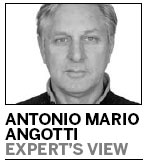-
News >Bizchina
Visit shows shift from 'zero-sum' approach
2010-06-01 10:13
Shortly after landing in Shanghai on May 21, US Secretary of State Hillary Clinton took a page out of Chinese President Hu Jintao's diplomatic playbook.
On her stopover before the Strategic and Economic Dialogue (S&ED) in Beijing, the highest-ranking official in the Obama administration in charge of US foreign policy sought a dramatic change in relations between the two nations.
Clinton called for a move away from relations built on traditional "zero-sum" game of power politics, often associated with the Cold War mentality of the past USSR-US rivalry, to a "win-win" strategy whereby both countries seek mutual and complementary benefits. Although some in the US still remain unclear on how to deal with the emerging economic and political power of China, the "win-win" view underlying President Hu's Peaceful Development policies are now apparently shared by Barack Obama's administration. In an attempt to build the "strategic" trust necessary to transition from a "zero-sum" to a "win-win" world view, the two nation's leaders established the S&ED with the hope of building understanding and developing mutual respect in the core interests of both countries.
Any attempt by Clinton to help promote a healthy and balanced view of China, and one where the relationship could, perhaps, develop into a "strategic partnership" rather one based on "strategic competition" will serve both nations, and the greater Asia-Pacific area, if not the world, greatly. For Clinton to win over those who would make China a target of Cold War thinking will take not only great skill, but also the willingness of Obama to engage the American people directly with concrete objectives and goals to develop a "win-win" relationship with China.Related readings:
 Sino-US ties' strategic importance growing
Sino-US ties' strategic importance growing
 US, China focus on hybrid, electric vehicles
US, China focus on hybrid, electric vehicles
Although pressure from Congress to "show results" from the S&ED, particularly with respect to the revaluation of the yuan, Clinton could also use her considerable political skills to attempt to convince Americans that China is part of the solution for fixing the US economy, not the problem, in spite of what some in Congress may say.
In a "win-win" scenario lifting the ban on all high-tech exports to China would be the bold move needed to cement the type of strategic partnership between China and the US needed for a transition to a more multi-polar world that the S&ED is fostering.
Antonio Mario Angotti is managing director for China and Central Asia of Swiss asset management company Praetorian Trust AG.
